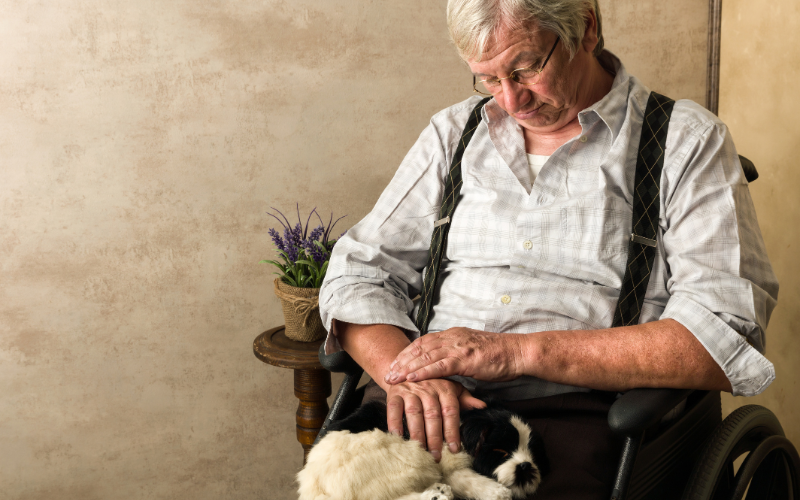
The recommended number of hours of sleep for adults is 7 to 9. When aging loved ones sleep longer or nap excessively during the day, families should investigate the potential causes and suitable remedies. Here are some reasons that seniors may oversleep.
What are causes of oversleeping in the elderly?
Excessive sleep becomes problematic when the elderly spend most of their time in bed rather than participating in life. They may nap during the day to compensate for waking up at night due to aches and pains or to use the bathroom.
Knowing what to look for helps families improve their aging loved one’s sleep patterns. Sometimes medical reasons may be the underlying cause, which makes it necessary for families to seek out the advice of a physician who can offer solutions.
1. Increasing Boredom
Oftentimes, the aging process is wearisome. Seniors develop chronic health conditions, such as mobility issues or impaired vision, that prevent them from participating in activities they enjoy. Their quality of life decreases when opportunities for outings, leisure activities, and entertainment are limited.
Poor vision disrupts reading satisfying books or assembling intricate puzzles. Although they are not clinically depressed, the monotony gets the best of them. Without much to look forward to, seniors spiral into boredom and choose to nap throughout the day.
2. Medication Side Effects
Eighty-nine percent of older Americans take prescription drugs. Half of these adults aged 65 and older take four or more prescription medications. Drugs are known to have side effects, some of which include drowsiness. Taking multiple medicines can intensify these effects.
Plus, seniors metabolize drugs differently than younger people, making them more susceptible to side effects, from drowsiness to dizziness. Caregivers should discuss drug alternatives with the senior’s physician, see if dosages can be reduced or find out if the medication can be stopped completely.
3. Onset of Depression
Feeling depressed can result from loneliness, social isolation, or losing interest in life. Depression, however, is not a normal part of aging. Sleep issues can be symptoms of depression. Caregivers should discuss their oversleeping with a doctor, as it may be indicative of changes to the senior’s mental health.
Approximately 16 percent of seniors show clinically relevant depressive symptoms. If the older adult is already taking anti-depressants, caregivers should be aware that these types of drugs can cause sleepiness. Communicate this side effect to the doctor so that the right medications can be prescribed.
4. Later Stages of Dementia
Alzheimer’s disease and other forms of dementia can cause a wide range of sleep-related issues, especially in the advanced stages of these progressive brain conditions. Seniors experience disruptions to their nighttime sleep when changes in the brain cause circadian rhythm disorders.
As dementia patients lose sleep during the night, they make up for it by napping excessively during the day. Sleep deprivation also worsens dementia symptoms, like agitation and sundowning. Nonpharmacological approaches are best, such as planning daytime activities to promote nighttime rest.
5. Changes to Health Conditions
Aging adults living with one or more serious medical conditions may oversleep when their disease has caused noticeable changes to their health. Death may not be necessarily imminent; however, caregivers are urged to seek the doctor’s recommendations for altering, adding, or stopping treatments.
Seniors who spend significant time in bed may not receive the nutrition, hydration, and medications their bodies need. Complications can subsequently arise, such as malnutrition, dehydration, and pressure ulcers. At this point, increased levels of care, such as skilled nursing or hospice, may be necessary.
In elderly individuals who are terminally ill, death may be approaching when they become inactive or experience long periods of unresponsiveness. In these cases, a hospice care provider is essential to ensuring the senior remains comfortable during the final days or weeks of life.
How do caregivers help older adults stay active?
Quality of life can be improved when seniors are encouraged to participate in enjoyable leisure activities, hobbies, and outings. The social interaction, mental stimulation, and physical activity reawaken their zest for life and can thereby combat their habitual tendency to oversleep.
When families are already consumed by caring for their own families and managing their careers, outside support is beneficial to achieving the end of increasing the senior’s enjoyment of life. In-home respite care from a home care agency is a recommended option for busy families.
Professional in-home caregivers establish daily routines that keep an aging care recipient active each day, thereby promoting quality rest at night. They take older adults on outings and encourage the pursuit of hobbies. The companionship of caregivers also widens the senior’s social circle.
Older adults benefit from regular social and physical activities and, in short, being optimally engaged with life. As a result, their boredom and depression decrease—both of which lead to better sleep at night and an enhancement of their overall quality of life.

If your aging loved one tends to oversleep, non-medical home health care from Assisting Hands Home Care can offer them the support they need to become active again. Our home care agency offers a wide range of in-home services designed to promote the physical, emotional, and social health of seniors.
Care options include compassionate Alzheimer’s and dementia care, 24-hour care, live-in care, and post-hospitalization care for seniors who’ve returned from surgery. Family caregivers get a break with our respite care services. Near the end of life, our quality hospice home care keeps the elderly comfortable.
Our caregivers are also excellent companions. By playing card games, assembling puzzles, going on outings, holding conversations, and encouraging leisure activities, we keep older adults socially and mentally engaged. Our efforts prevent the loneliness and isolation that can cause depression.
All our care services include non-medical support with the activities of daily living, from personal hygiene tasks to transportation. Choose Assisting Hands Home Care for high-quality, personalized senior home care in Medinah, IL | Glendale Heights, IL | Itasca, IL | Bensenville, IL | Elmhurst, IL | Villa Park, IL | Addison, IL | Lombard, IL and the surrounding areas. Call us at (630) 526-6522 to schedule a free in-home consult today to learn more about our top-rated services.















